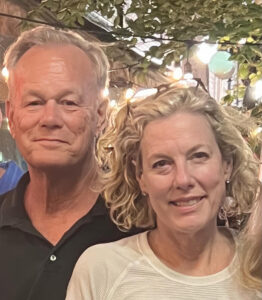Donor Stories
Practical Hope through a Living Trust: Bruce and Cindy Hanson
 With ancestral roots in Norway and experiential roots in China, Bruce Hanson is steeped in traditions of practical austerity and pragmatic action. Both of his grandfathers came to the United States as indentured servants to pay their way from Norway, and they settled in small farming Norwegian communities in Iowa and Minnesota. These roots have now led Bruce to identify the Institute for Ecological Civilization and other related causes as beneficiaries of the living trust that he and his wife, Cindy, have created.
With ancestral roots in Norway and experiential roots in China, Bruce Hanson is steeped in traditions of practical austerity and pragmatic action. Both of his grandfathers came to the United States as indentured servants to pay their way from Norway, and they settled in small farming Norwegian communities in Iowa and Minnesota. These roots have now led Bruce to identify the Institute for Ecological Civilization and other related causes as beneficiaries of the living trust that he and his wife, Cindy, have created.
Bruce’s parents were both missionaries in China where his father was headmaster of a school and his mother was a nurse – at one point serving one million women and children sheltering in a refugee camp in the late 1940s. They didn’t meet until both were on their way out of China, but it must have been love at first sight, because they married just weeks later in Iowa. With his father teaching world religions at Augustana College, Bruce grew up in Sioux Falls and went on to graduate from Augustana himself in sociology and art. He became heavily involved in socio-economics and ecological causes, and spent a lot of time outdoors in the Black Hills and on the Rosebud Reservation.
Practical Living
During the Vietnam War, Bruce was a conscientious objector and served as an orderly in Minneapolis/St. Paul, Minnesota, becoming very involved in a local food cooperative in neighborhood reformulation. At that time, he lived on under $100 a month for food and housing.
In those early years, Bruce was heavily influenced by the philosophical, theological, and ecological work of John B. Cobb, Jr., who centers his writing around what is known as “process thought.” Process thought describes the world in a relational and holistic way and sees the entire cosmos and all beings within it as having intrinsic value. It is recognized as very ecological.
Practical Work
Bruce’s master’s education led him to urban studies and research on holistic city planning. Then his doctoral work in organizational behavior guided him to a teaching and administrative career, with positions at Pepperdine, Colorado Technical University, and finally Concordia University-Irvine. His love of China led him to additional teaching work in universities there and in Thailand.
Now, in his retirement, he is focused on sustainability and aesthetics (art, music, etc.) in the Ojai Valley where he lives with Cindy and their two dogs. “My interest,” he says “is in helping to alleviate suffering in the coming ecological crisis through understanding reality as accurately and coherently as possible. Following the Buddhist aphorism that suffering is caused by illusion, I am attempting to describe the socio-cultural process as realistically as possible.”
Practical Hope
Bruce was drawn to the work of the Institute for Ecological Civilization because he is profoundly moved by its vision and the character and capabilities of its president, Philip Clayton with whom Bruce has done some co-teaching. When he was first introduced to the idea of “ecological civilization” he says that it “made a lot of sense, because of my background in China. Like the Chinese people, it is very pragmatic and that gives me hope.”
What inspired Bruce to include EcoCiv in his estate planning? He says that he’d like to “do all that I can to help facilitate the emergence of ecological civilization.” Bruce and Cindy have no children of their own, and while they do plan to remember family members in their will, they are moved to generously support the causes that they have cared so deeply about during their life together.
“Grounded in my local practice in the Ojai Valley and through projects in China,” says Bruce, “I would like to help develop organizations capable of spiritually nurturing Ecological Civilization.” He is concerned that humans may “fall apart” as we all face what is likely before us in terms of ecological devastation. The future may not be good, he believes, but “it’s not annihilation. Though there is no way to avoid the rising of sea levels, desertification, and great loss of insect and plankton populations that we are already seeing,” Bruce believes that we can proceed in a “sane and humane” manner. He feels strongly that developing bioregions that can take care of themselves may be a key path forward.
That path forward needs deep spiritual and pragmatic roots to get us to ecological civilization. “When we can see the difficulties we face without shrinking from them, and still hold a positive view of life and the world by incorporating the kind of thinking we find in process thought, Buddhism, Taoism, and contemplative Christianity that’s where the hope comes for me. And it’s a practical hope.”
What is Bruce’s advice for others who may be considering a bequest, charitable trust, or other planned gift for EcoCiv? “Think about the long-term stability. How do we live so that humans will be here in a thousand years? That’s the Chinese timescale. EcoCiv needs to be around for a hundred years, and I’d like to help with that.”
